London – YouTube has been the platform most used by Brazilians as a news source this year.
Facebook remains the world leader, but on a downward trend, while Instagram and TikTok were the fastest growing platforms for information search.
The results are from the Digital News Report 2022, the most comprehensive survey of trends in news consumption, trust and journalism in the world. call.
Facebook gives way to YouTube as the main social media for news in Brazil
Survey covering 46 markets, a decline in confidence in the news in general, including Brazil, where the decline was six percentage points.
Research on the public’s behavior towards news shows that YouTube ranks first not only in Brazil, but also in Japan, South Korea, India and Turkey.
The numbers reflect access to independent news sources such as websites and blogs through the platforms, as well as traditional media outlets such as newspapers, radio and TV stations that maintain channels on social media.
The researchers claim that data from Brazil and other countries confirms the trend of an increasingly digital news media landscape dominated by platforms and having the smartphone as the main access device.
According to the Reuters Institute, YouTube took the lead in Brazil with 43% of respondents, followed closely by WhatsApp (41%) and Facebook (40%).
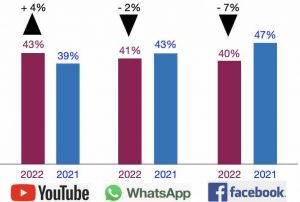
In the last issue of the survey, the most used platform for information by Brazilians was Facebook with 47%, followed by WhatApp (43%) and YouTube (39%).
The decline of the top two and a growth of four percentage points jumped YouTube to the top spot.
Opt for more visual news sources
The authors explain that the changes are closely linked to the emerging habits of a new generation of “social natives” who prefer to access news via more visual networks, a trend that has occurred over the past three years.
When it comes to information, the platforms that have grown the most at the global level were Instagram and TikTok. It’s just them and Telegram has grown globally in the latest Reuters poll.
TikTok was the fastest growing network globally, especially in the 18-24 age group, with 15% already using the platform for news.
However, its use for information-seeking is spreading across all age groups in countries with higher levels of use, such as Kenya, South Africa, Thailand, Indonesia, Brazil and Peru.
The platforms that gained the most supporters for news search among Brazilians were Instagram and TikTok: both increased their shares by 5 percent.
Instagram was ranked fourth, up from 30% to 35%. And TikTok tapped Twitter for the fifth place contest, going from 7% to 12%.

Researchers emphasize that the war between Russia and Ukraine has helped TikTok increase its share as a global news source.
Ukrainians used the internet to document their experiences in the conflict and received millions of views in the process. BBC News, which initially decided to avoid TikTok, created Russian-language channels to combat the misleading information shared on the platform about the war.
More people use social media to access news than online media channels
The survey also highlighted an inflection point that has occurred since the last measurement in 2018, where access to news via social media surpasses direct access via websites and media outlets’ apps for the first time.
According to the researchers, these changes are driven by the habits of social natives as they reach adulthood.
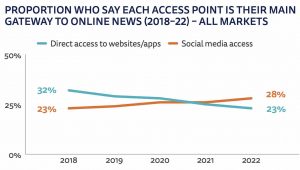
In the global sample, nearly three out of ten (28%) say they access the news via social media, while supporters of direct access are limited to 23%.
In 2018, the number of people who reached the news through vehicle channels was 40% more than those who preferred to be aware of social media.
The number of Brazilians reaching news via social media is well above the world average of 28%. In Brazil, almost half (46%) of respondents said they accessed the news via social media or email. Of the 46 countries studied, only fifteen had a higher rate.
Nigeria is the champion of accessing news on social networks with 66%. Of the ten countries with the most access to news via social networks, four are from Latin America, three from Africa, and three from the Asia-Pacific region.
On the other hand, the number of Brazilians who reach the news through direct means of communication is well below the world average of 23%.
Only 11% said they accessed the news in this way, the second lowest rate in the world, second only to South Korea, where YouTube is also the most used network for information.

YouTube, the world’s second largest news outlet
Globally, Facebook still ranks top globally for news sharing, but is losing ground, down 12 percentage points since 2016.
Preferred by Brazilians for this purpose, YouTube has ranked second in the global ranking since the beginning of the survey, ahead of WhatsApp, which was third in 2016.
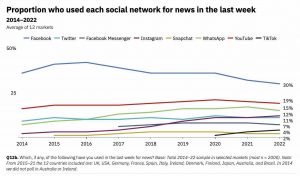
Twitter has stagnated over the past decade in terms of its user base, although it remains hugely influential with journalists and politicians.
And with Elon Musk’s attempt to take over the company and the subsequent loss of senior executives, no one’s future is predictable.
Read more
Trump Returns, Layoffs, ‘Project X’: What Is Elon Musk Planning For Twitter?
Misinformation on social media
The survey found that those who access news via social media have a greater fear of falling victim to online misinformation.
Overall, just over half (54%) of respondents say they are concerned, given those who access the news directly from and through the media. fake news on the internet.
However, those who say that they mostly use social media as a news source (61%) are more worried than those who do not (48%).
Also, the regions with the highest level of concern – Africa and Latin America – are precisely those with the highest rates of news reach via social media.
Social media is the only growing news source in Brazil
The research shows that access to news from all traditional sources in Brazil has fallen since 2013 and has fallen more sharply in print media.
Behavior follows the global trend that access to news through traditional media such as TV and print media has fallen further in nearly all markets over the past year, showing that online and social consumption is not filling this gap.
According to this year’s survey, reach via social media was the only growth in Brazil that increased the advantage of television, rising one percentage point to 64% and falling from 61% to 55% in the same period.
Online maintains its lead by percentage from last year, but its index includes access to news tools via social media.
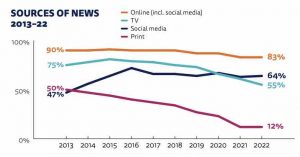
The decline in print media provided a revival and remained stable at the same 12% year-on-year. But its negative effects were offset by online access to newspapers and magazines.
The study calculates that by the end of 2021, digital subscriptions represented 67% of the circulation of the ten best-selling newspapers in Brazil.
Smartphone, main device for accessing news sources
While the smartphone remains the most used device to access news sources in every country, whether on YouTube or other channels, it recorded the first overall global drop since the survey began. peak of the pandemic.
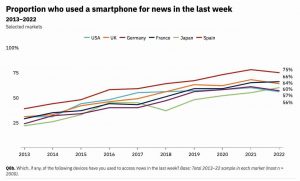
In Brazil, this decline was less pronounced, and the smartphone continues to have a broad advantage over computer access, with a rate of three times higher.
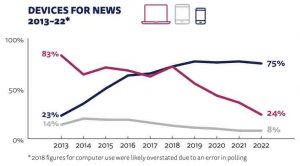
Brazil has one of the biggest dips in news interest
The study also showed a general decline in interest in the news, as well as showing that access to news sources around the world has come under the dominance of social media platforms.
The bad news is that Brazil is among those that experienced the biggest drop in interest.
Considering the period between 2015 and 2022, the research highlights that Argentina, Brazil, Spain, the United Kingdom and the United States were the countries that showed the biggest declines in news readers during this period.
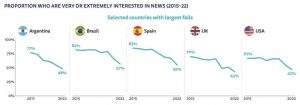
The flip side of the coin is that, despite the decline, the Brazilian index (57%) is still above the global average, which fell sharply from 67% to 47% over the same period.
The effect on mood is one of the reasons for avoiding the news
Because of this low interest, the survey reveals that global news consumption has dropped significantly and in some countries.
One of the reasons cited was that about four out of ten interviewees said they began to avoid the news because of the negative effects it had on them.
Brazilians are among the most adopters of this news avoidance practice.
read it too
Doomscrolling: Why We’re Suffered by Bad News and 5 Ways to Avoid the ‘Depressive Effect’
Brazil’s index (54%) was the third highest of the 46 countries surveyed and doubled compared to 2017.
Over the same period, the global average of news avoidance increased much less, from 29% to 38%.
Respondents in the global sample say they have begun to avoid the news because of its repetition, particularly on political issues and the pandemic (43%).
About a third (36%), mostly under the age of 35, say the news affects their mood, and 29% say they feel tired from the amount of news they receive.
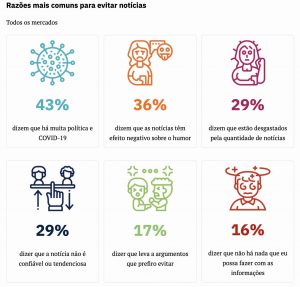
A significant proportion (29%) say that they avoid the news because they think it is unreliable.
Others say that certain news has caused controversy (17%) or made them feel helpless (16%) that they prefer to avoid.
A smaller proportion say they don’t have enough time for the news (14%) or it’s too hard to understand (8%).
Brazilians prefer opinion to the impartiality of journalists on the networks
Contrary to the global trend pointed to by the survey, which favors neutrality when journalists speak on their social networks, nearly two-thirds of Brazilians interviewed said they prefer press professionals to express their personal views.
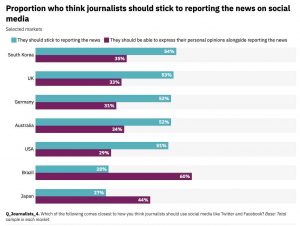
In most countries, more than half of the respondents felt that, unlike Brazil and Japan, journalists should limit themselves to reporting news in an impartial manner.
Globally, youth groups are more likely to prefer journalists to express their personal views when posting on networks.
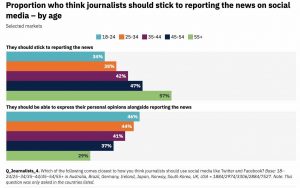
read it too
source: Noticias
[author_name]

